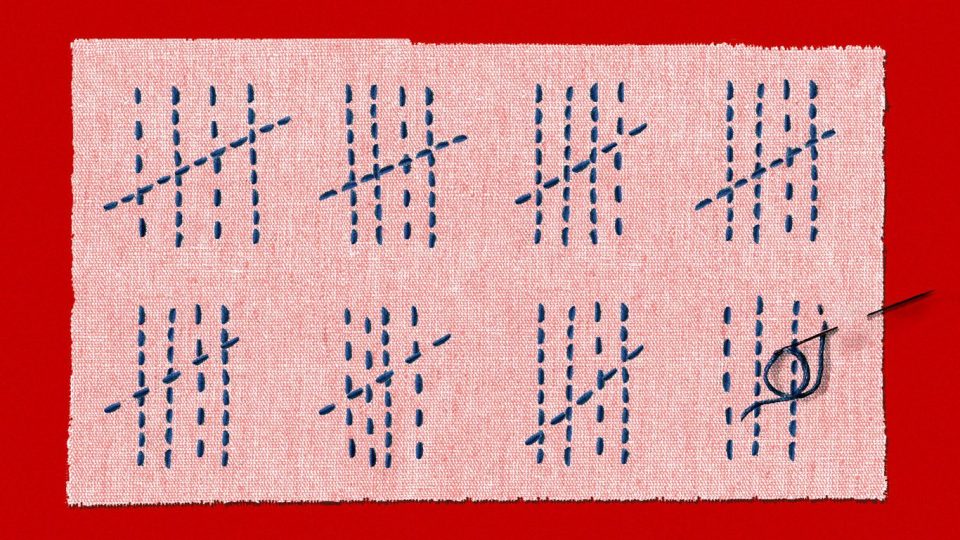A China-based supplier of clothing items to U.S. construction equipment manufacturer Caterpillar participates in a coercive labor program known as “Xinjiang Aid,” according to documents and evidence reviewed by Axios.
Why it matters: It is against U.S. federal law to import products made through forced labor.
What’s happening: Summit Resource International, the exclusive wholesaler of Caterpillar-branded men’s and women’s clothing to retail, received multiple shipments of tens of thousands of pounds of Triton jackets and Trademark trousers from Xinjiang Ainuoxin Garment Co. and Jinan Ainuoxin Garment Co. between August 2019 and June 2020, according to research compiled by Worker Rights Consortium, an independent labor monitoring organization, and reviewed by Axios.
- These two factories participate in Xinjiang Aid, a Chinese government labor transfer scheme that has been widely denounced by researchers and human rights groups as coerced labor and a forced assimilation campaign targeting Uighurs, a predominantly Muslim ethnic minority.
- It’s difficult to trace whether Uighurs working at the factories were directly involved in the production of Caterpillar-branded clothing.
“Caterpillar’s decision to continue sourcing from Xinjiang is a display of gross irresponsibility,” said Penelope Kyritsis, assistant research director at Worker Rights Consortium.
What they’re saying: “We do not condone and strive to eliminate all forms of forced labor, child labor, and discrimination in the workplace,” Caterpillar has said in its online statement on human rights.
- “Caterpillar believes the risk of modern slavery is low in its operations and those of its direct suppliers,” the company has said.
- “Caterpillar currently does not utilize a third party in its verification process. We also do not currently perform on-site audits for social compliance,” the online statement read. Caterpillar instead asks its suppliers to perform self-assessments.
- The company declined to provide further comment.
Background: Xinjiang Ainuoxin Garment Co. is located in Yarkant County in southern Xinjiang, where the Chinese Communist Party has rounded up hundreds of thousands of Uighurs and kept them in mass internment camps, eventually transferring some into forced labor facilities under the guise of “alleviating poverty.”
- The Xinjiang Aid program takes former detainees, as well as Uighurs from surrounding villages, and puts them to work in factories where they are often subject to political indoctrination, Chinese language classes (part of a region-wide effort to weaken Uighur cultural identity through reducing their reliance on the Uighur language), and extremely tight surveillance under the constant supervision of security guards.
- Tens of thousands of workers have been separated from their families and sent to work in factories in distant provinces under similar conditions.
Details: The Yarkant County Poverty Alleviation and Development Office stated on July 2, 2019, that the local Chinese Communist Party secretary helped bring in Xinjiang Ainuoxin Garment Co. as part of the county’s “poverty alleviation” program, according to a document provided to Axios by Adrian Zenz, a leading expert on Xinjiang mass detention camps and forced labor policies. The document mentions Mandarin classes and strict discipline.
- Subsidies: Xinjiang Ainuoxin Garment Co. is included on a list of companies receiving subsidies for their participation in Xinjiang Aid, according to a notice issued by the Yarkant County government.
- Labor transfers: Xinjiang Ainuoxin has also engaged in labor transfers, according to official media reports.
- The village committee “coordinated with the factory to obtain training opportunities inland, and organized 15 female employees to study sewing techniques in Jinan, Shandong,” according to a November 2018 report from a Kashgar radio station.
The big picture: Many state media reports cast Xinjiang Aid as a benevolent program focused on poverty alleviation and skills training, featuring quotes from grateful Uighurs.
- But “the reality is drastically different from what is described in state media,” said Vicky Xiuzhong Xu, the lead author of the Australian Strategic Policy Institute report “Uyghurs for Sale,” in an interview with Axios.
- The program “isn’t designed for the benefit of the Uighurs,” said Xu, but is rather intended to achieve state objectives through total surveillance and threat of detention in Xinjiang’s ubiquitous internment camps for anyone who pushes back.
- And sadly, the Han employees at factories participating in Xinjiang Aid often don’t see any problem, said Xu. “It says so much about systemic Han racism against Uighurs.”
Go deeper: The U.S. has the tools to fight Uighur forced labor


